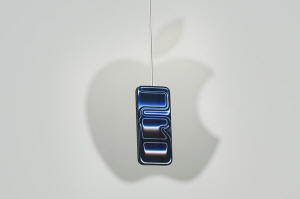Apple delivers strong quarter despite trade war challenges and ongoing
artificial technology issues
[October 31, 2025] By
MICHAEL LIEDTKE
SAN FRANCISCO (AP) — Apple delivered financial results during its
summertime quarter that exceeded analyst projections, despite being
caught in the crosshairs of a global trade war at the same time the
trendsetting company is scrambling to catch up to its Big Tech peers in
the artificial intelligence race.
The performance announced Thursday was driven largely by strong initial
demand for its iPhone 17 lineup that went on sale last month.
Although the iPhone 17 lacks the AI wizardry featured in rival devices
recently introduced by Samsung and Google, Apple spruced up its latest
models with a redesign highlighted by a sleek “liquid glass” appearance
on the display screens.
Apple also largely maintained its pricing on its latest iPhones, despite
being squeezed by the tariffs that President Donald Trump has imposed on
the U.S. devices that the company mostly makes in India and China. The
tariffs cost Apple $1.1 billion during the past quarter and are expected
to cost another $1.4 billion during the final three months of the year.
The formula apparently was enough to win over consumers, particularly in
the United States and Europe, helping to produce iPhone sales totaling
$49 billion during the July-September period, a 6% increase from the
same time last year. That was slightly below the 8% jump in iPhone sales
that had been anticipated by analysts, and less than the 13% bump in
sales during the April-June period.
IDC estimates that 58.6 million iPhones were sold worldwide in the
July-September quarter, putting Apple second behind Samsung at 61.4
million of their Android-powered phones sold worldwide in the quarter.

Buoyed by the iPhone results, Apple earned $27.5 billion, or $1.85 per
share, nearly doubling its profit from a year ago. Revenue climbed 8%
from a year ago to $102.5 billion. Both the earnings and revenue
eclipsed the analyst forecasts that steer the stock market.
Apple shares surged 3% in extended trading after the numbers came out.
In a conference call with analysts, Apple CEO Tim Cook indicated his
belief that the iPhone 17 lineup will continue to do well, predicting
even more of the devices will be sold during the final three months of
the year. “As we head into the holiday season with our most powerful
lineup ever, I couldn’t be more excited for what’s to come,” Cook said.
He cited the iPhone 17's popularity in most parts of the world except
China, where sales of the device dipped by 4% from a year ago.
[to top of second column] |

The iPhone 17 Pro is displayed during an announcement of new
products at Apple Park on Tuesday, Sept. 9, 2025, in Cupertino,
Calif. (AP Photo/Godofredo A. Vásquez, File)
 The Cupertino, California, company
expects its iPhone sales to increase at least 10% from last year's
holiday season, according to projections provided by Apple's chief
financial officer, Kevan Parekh. Total revenue is expected to rise
at a similar rate.
Apple’s stock has been on a tear since a report earlier this month
from the research firm International Data Corp. telegraphed the
quarterly results with a preliminary analysis that concluded the
company had set a new July-September record for iPhone sales. The
rally catapulted Apple’s market value above $4 trillion for the
first time earlier this week and now the stage is set for the shares
to hit another new high during Friday's regular trading session.
But Apple has been widely seen as a laggard in the AI craze, one of
the reasons that Nvidia — a chipmaker whose processors power the
technology — became the first company to be valued at $5 trillion
earlier this week.
Apple had promised a wide array of AI features would be rolling out
on last year’s iPhone models, but was only able to deliver a few of
them. The missing upgrades included a smarter and more versatile
version of its frequently flummoxed Siri virtual assistant – a
makeover that Apple now doesn’t expect to complete until next year.
But Apple has a long history of late starts when technology starts
to head in another direction before it finally catches up and
emerges as a front-runner.
If Apple can pull it off again by eventually implanting more AI
features on the iPhone, Wedbush Securities analyst Dan Ives believes
those breakthroughs could boost the company’s market share by
another $1 trillion to $1.5 trillion, translating into $75 to $100
per share.
All contents © copyright 2025 Associated Press. All rights reserved
 |